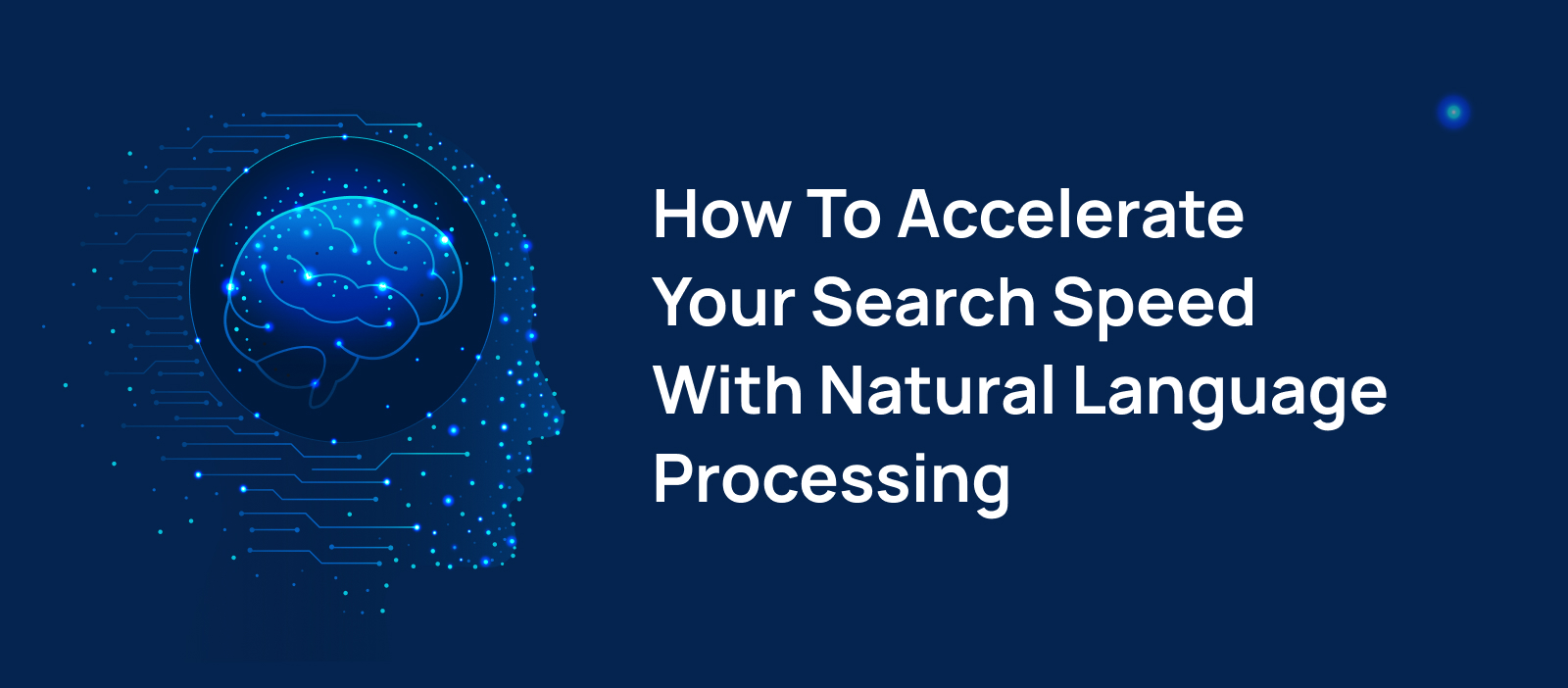How to Accelerate Your Search Speed with Natural Language Processing
April 22, 2025

“Various research-based approaches have been developed to improve the optimization performance of search engines over the past decade; however, it is still unclear what the strengths and weaknesses of these methods are. As a result of the increased proliferation of Machine Learning (ML) and Natural Language Processing (NLP) in complex content management, there is potential to achieve successful SEO results.” – Research Gate
In the fast-paced digital landscape of today, getting information quickly is a necessity. NLP is changing the dynamics of search mechanisms because it empowers systems to understand and interpret human language better. With NLP, search engines and applications can bring back results that are relevant in a much shorter period of time, thus increasing the user experience manifold.
From simple web queries to data retrieval in large databases, natural language processing enhances the entire process by leveraging sophisticated algorithms, semantic analysis, and context-aware techniques. Discover how to accelerate your search speed with natural language processing, unlocking the potential for faster, smarter, and more accurate search capabilities.
Understanding How NLP Speeds Up Search Speed
NLP helps speed up the search through better interpretation of language, semantic understanding, and handling of context-aware queries. These capabilities help the systems process and deliver results faster and more accurately, which can be applicable to both search engines and enterprise databases. To build productive data-driven applications that are competitive with efficiency and precision in search operations, NLP is taken as an aspect.
6 Key Factors Influencing Search Speed
1. Algorithm Efficiency
The design and optimization of search algorithms directly impact the speed at which results are retrieved. Faster algorithms ensure quicker data processing.
2. Indexing Techniques
Efficient indexing structures, such as inverted indexes, allow systems to locate and retrieve data rapidly.
3. Hardware and Infrastructure
Good-performing servers, adequate memory, and strong storage solutions greatly support the acceleration of searches.
4. Volume and Complexity of Data
Greater amounts of data or complex queries will slow searches down unless handled with scalable solutions.
5. NLP
Techniques such as semantic search and contextual understanding further support speeding up search performance by reducing the set of results to be scanned.
6. Caching and Preprocessing
Store frequently accessed data or preprocess queries, making a search less time-consuming, especially for repetitive searches.
🚀 Want to Unlock the Full Power of NLP in Your Search Tools?
Let us help you implement NLP solutions to enhance your search performance.
👉 Contact our AI & NLP specialists today for a free consultation.

What is Natural Language Processing?
NLP is an artificial intelligence discipline that allows the computer to understand human languages in which they are being spoken or written. Merging computational linguistics and advanced techniques in machine learning, statistics, and deep learning, NLP provides systems to analyze text data or voice data and contextualize them to recognize intent and emotion.
NLP is what drives applications such as text translation, voice recognition, summarization, and chatbots to improve user experience in tools like digital assistants and speech-to-text software. Using advanced NLP techniques can help search systems process queries more efficiently, yielding faster, context-aware results. This revolutionizes industries such as medical research, search engines, and business intelligence, where precision and speed are paramount.
How NLP Differs from Traditional Search Algorithms
Traditional search algorithms depend upon keyword matching and simple indexing to generate results and may not work with regard to context and intent. Compared to that, NLP uses the latest techniques, including transformers, for better search speed and semantic search acceleration. NLP understands what the words carry, such as nuances and relationships that are missed with traditional methods. This delivers more accurate, contextualized search results.
Key Differences:
1. Context Understanding
NLP captures the context of queries, whereas traditional algorithms are based on exact matches.
2. Semantic Search
NLP identifies relationships between terms; traditional methods rely on literal matches.
3. Transformers
Advanced NLP models like Transformers improve speed and accuracy, which traditional algorithms lack.
4. Intent Recognition
NLP deciphers user intent; traditional systems retrieve results based solely on keywords.
5. Adaptability
NLP works through language variation, whereas the traditional method has problems with synonyms or phrase changes.
6. Handling Ambiguity
NLP solves the problem of ambiguity in queries, whereas traditional search cannot.
7. Learning Capability
NLP improves with data as it uses machine learning. But traditional algorithms are fixed.
Core Component of NLP
The core components of NLP are foundational for improving how systems understand and process language. Using high-level NLP techniques in these components is crucial in speeding up search systems with NLP, thereby optimizing their speed of search. Essential components are:
-
Tokenization: To break the text into readable units that can be handled.
-
Stemming and Lemmatization: Word reduction to stem forms or to root forms.
-
Semantic Analysis: Accelerate the meaning behind the words of a semantic search.
-
Named Entity Recognition: Find out what names, addresses, and more are relevant to your needs.
-
Contextual Understanding: Context is critical to delivering high relevance and accuracy
Together, these elements ensure search speed optimization and maximize the effectiveness of any search system.
Role of NLP in Search Optimization
Natural language processing in search optimization is crucial for enhancing the way systems process language. LLMs such as GPT-4 automate tasks including keyword research, content generation, and SEO optimization. AI speeds up searches, improves link building, and helps with performance analysis; this eventually saves time while improving the quality of the content and search results.
Techniques to Accelerate Search Speed with NLP
Improving user experience and efficiency in operations requires search speed acceleration with NLP. Improved handling of queries and delivery of results utilizing advanced techniques in NLP. Five key techniques are discussed below.
-
Transformers for Better Search Speed: Utilize context-aware models in improving the query processing.
-
Semantic Search: Improve relevance through meaning-based results.
-
Contextual Understanding: Understand the query with more context.
-
Stemming and Lemmatization: Reduce words to their base forms.
-
Indexing Optimization: Optimize indexing to reduce data retrieval time.
⚡ Looking to Scale Search Efficiency with AI?
Boost your performance and user satisfaction using our customized NLP-based search solutions.
📞 Schedule a quick discovery call and let’s get started.
Challenges in Accelerating Search Speed with NLP
Accelerating the search speed through NLP is the application of advanced NLP techniques for enhanced efficiency and accuracy. However, the implementation of natural language processing in search optimization of a search faces challenges that influence performance and scalability. Such challenges include:
-
Ambiguity in Language: Difficulty in the interpretation of various meanings.
-
Data Volume: The management of large volumes of data.
-
Real-Time Processing: Quick responses are one of the biggest challenges.
-
Complex Queries: It becomes stringent to handle complex or long queries.
-
Resource Intensity: Highly computationally demanding.
-
Domain Adaptation: Adaptation of models to particular domains becomes difficult.
-
Accuracy vs. Speed: Balancing precision with optimization.
These are the areas that need to be tackled to ensure efficient search speed optimization.
Tools and Libraries for NLP-based Search Acceleration
This technique relies on powerful tools and libraries to optimize performance to search accelerators for speed. Here are five essential options:
-
TensorFlow: A versatile library for constructing complex NLP models.
-
PyTorch: Popularly for its utilization of transformers for better speeds of search.
-
SpaCy: Natural language processing is efficient while trying to optimize search.
-
ElasticSearch: Integrate semantic search accelerations with scalable indexing capabilities.
-
Hugging Face Transformers: Gives pre-trained models for speed optimization in search.
These tools enable developers to build faster, smarter, and more accurate search systems.
Real-world Applications of NLP in Search Speed
NLP, with machine learning in search systems, revolutionizes the way data is processed and retrieved. The role of AI in search speed enhancement allows NLP applications to provide faster and more accurate results. Here are some key real-world applications:
-
Search Engines: Use NLP for semantic search and context-aware query handling.
-
E-commerce: Improve product search with advanced filtering and recommendations.
-
Customer Support: Chatbots can instantly use NLP to deliver highly relevant responses.
-
Healthcare: Fasten up access to medical data for diagnostic and research purposes.
-
Business Intelligence: Fast analysis of huge data volumes for actionable insights.
Conclusion
Finally, the key thing to using natural language processing well is to increase the efficiency and accuracy rates of search systems. What NLP does is allow systems to process queries almost instantly, with results being highly relevant via advanced techniques such as semantic analysis and contextual understanding. machine learning, and more, making use of tools that can really accelerate search systems with NLP, optimizing and enhancing both user experience as well as operational performance at the same time.
As data continues to grow exponentially, it will become imperative to understand how to speed up your search speed with natural language processing in order to be competitive in today’s fast-paced digital landscape.
📌 Frequently Asked Questions (FAQs)
1. What is NLP in search engines?
NLP (Natural Language Processing) allows search engines to understand the context and intent behind user queries, delivering more accurate and faster results.
2. How does NLP improve search speed?
NLP speeds up search by enabling semantic understanding, intent recognition, and context-aware processing, reducing irrelevant result scanning.
3. Can NLP replace traditional search methods?
NLP enhances traditional search methods by adding intelligence to keyword-based queries, not replacing them but complementing and optimizing them.
4. What are some real-time challenges in NLP-based search?
Challenges include ambiguity in queries, real-time performance demands, domain-specific adaptation, and maintaining the balance between speed and accuracy.
5. Which tools are best for implementing NLP in search systems?
Top tools include TensorFlow, PyTorch, SpaCy, Hugging Face Transformers, and ElasticSearch for semantic and scalable NLP applications.
Want to implement NLP to improve your product’s search speed? Talk to our AI experts or explore our NLP solutions to get started today.
Keep reading about
LEAVE A COMMENT
We really appreciate your interest in our ideas. Feel free to share anything that comes to your mind.
Our 16 years of achievements includes:
-
10M+
lines of codes
-
2400+
projects completed
-
900+
satisfied clients
-
16+
countries served




